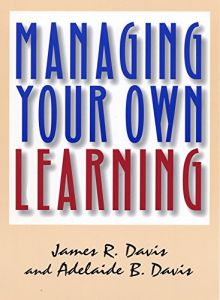Join getAbstract to access the summary!

Join getAbstract to access the summary!
James R. Davis
Managing Your Own Learning
Berrett-Koehler, 2000
What's inside?
Before you can learn the things you need to know to succeed, you must first figure out what it is that you don’t know.
Recommendation
Managers and trainers rely on James R. Davis and Adelaide B. Davis’ book on training strategies, which the authors now have adapted as a personal self-help guide to learning. Although they touch briefly on underlying learning theories and present examples of learning from diverse academic fields (i.e. psychology, sociology, philosophy and communications), this is primarily a step-by-step manual. It begins with a brief self-assessment, guiding you to examine your strengths and weaknesses and to decide what you want to learn. Then, the authors explain how and when to use each of the seven major approaches to learning: behavioral, cognitive, inquiry, mental models, collaborative, virtual realities and holistic learning. They also suggest the best ways to learn in each category. Their well organized book lists major principles, enumerates rules, and provides a summary of each chapter. getAbstract recommends this individually directed manual to those who wish to make the most of the time they spend absorbing new information.
Summary
About the Author
James R. Davis is a professor at the University of Denver. His books include Better Teaching, More Learning and Interdisciplinary Courses and Team Teaching. He co-authored Effective Training Strategies: A Comprehensive Guide to Maximizing Learning in Organizations with Adelaide B. Davis. She served as a training analyst for a state-managed public utilities company, and taught human resource management at the Federal University of Minas Gerais, Belo Horizonte, Brazil.

















Comment on this summary